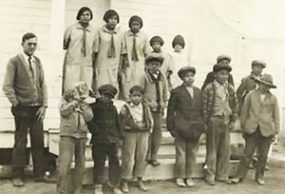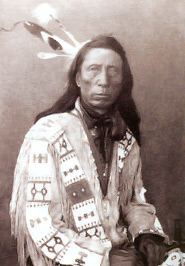
| Oct. 2018 | |||||||||||
| Top stories | |||||||||||
| In the news | |||||||||||
| Photos | |||||||||||
| Contact us | |||||||||||
| Archive | |||||||||||
|
Survivor recounts 1918 influenza and Sioux tribe |
Oct. 31, 2018 --
This is the story of the 1918 flu pandemic as told by my 97-year-old grandmother, Sadie Afraid of His Horses-Janis. In September 1918, Sadie′s grandmother, Nancy Poor Elk-Red Cloud went with her extended family totaling 18 men, women and children to Alliance, Neb., to pick potatoes. The journey from Pine Ridge, S.D., to Alliance took five days by wagon. “Spud Pickin’” was an economic venture for the Indians on the Pine Ridge Indian Reservation; it was a way to earn money to buy food for the winter.
 Sadie Afraid of Horses-Janis (top row, far left) attending #19 Day School in 1923
Sadie Afraid of Horses-Janis (top row, far left) attending #19 Day School in 1923
The Red Cloud family had just finished picking potatoes at the end of October 1918 when they were told of “a real bad sickness that was coming,” and that they should start for home. They had just started to break camp when the middle-aged members of the family started to get sick with the flu. The family decided to stay at Alliance until they were well enough to travel home to Pine Ridge.
My grandmother was afraid that her family would die from the flu. Also, the train would stop in Alliance to bring home the bodies of the soldiers who had died in WWI. It was eerie for the child to watch the constant stream of wagons going to the graveyard every day to bury the soldiers and those who had died from the flu.
 Chief Jack Red Cloud
Chief Jack Red Cloud
The Red Cloud family was anxious to get home because they had received word that members of their family in Pine Ridge had died from the flu, too. So, they started out from Alliance with the grandmothers driving the wagons. Sadie remembers that this was ironic because her cousin Edgar was the one who had driven their elderly grandmother′s wagon on the way to Alliance, but now he lay ill in the back of the wagon box and their grandmother was driving the horses.
The family got to Gering, Nebraska when it started to rain. The drizzling rain made the members of the family who were suffering from the flu get worse. “Thankfully,” says Sadie, “A farmer told them to camp at his farm till the rain stopped.”
Seeing that the situation was becoming dire, Sadie’s Grandmother Nancy took charge and told everyone to stay in their tents and she would bring them food and medicine. Everyone who got sick was placed in a tent of their own. Nancy boiled a big bucket of flat cedar tea, which she took from tent to tent to fill their individual cups. She made certain they used their own cups and that there was no sharing of personal items like washbasins or utensils. Nancy “smugged” the tents with sweet grass so they could breathe better and to ward off evil spirits. Severe coughing would close off their throats, so she mixed a teaspoon of kerosene and sugar together and fed it to them. Sadie′s father, Frank, was delirious with fever. Nancy rubbed an ointment on his forehead.
All the members of the Red Cloud family survived. Sadie says they all had a good laugh later remembering the sugar and kerosene. She was also happy that from that point onward everyone received their own personal items like washbasins, combs, and dishes.
On Nov. 11, 1918, Sadie′s brother Paul came running home from town yelling that the war had ended. Church bells rang, guns were being shot into the air, and there were shouts of joy everywhere. Sadie says “it was the best time because the war had ended and the Red Cloud family had survived a “bad sickness.”
In her desperation, my great-great-grandmother, Nancy, had applied the principals of quarantine, prevented cross–contamination, provided hydration and inhalation therapy, and used pharmacology to save her family. To this day, my grandmother Sadie has a medicine bag with flat cedar, sweet grass, bitter–root, and green tea. However, she says she′ll pass on the kerosene and sugar.
Despite her advanced years, Sadie never complains of being sick, treats her minor afflictions herself, and has a better memory than people less than half her age. Sadie says the only pain in her life is the offensive line of her beloved Denver Broncos football team.
Courtesy of CDC Pandemic Influenza Storybook as told by Vanessa Short Bull, edited for space